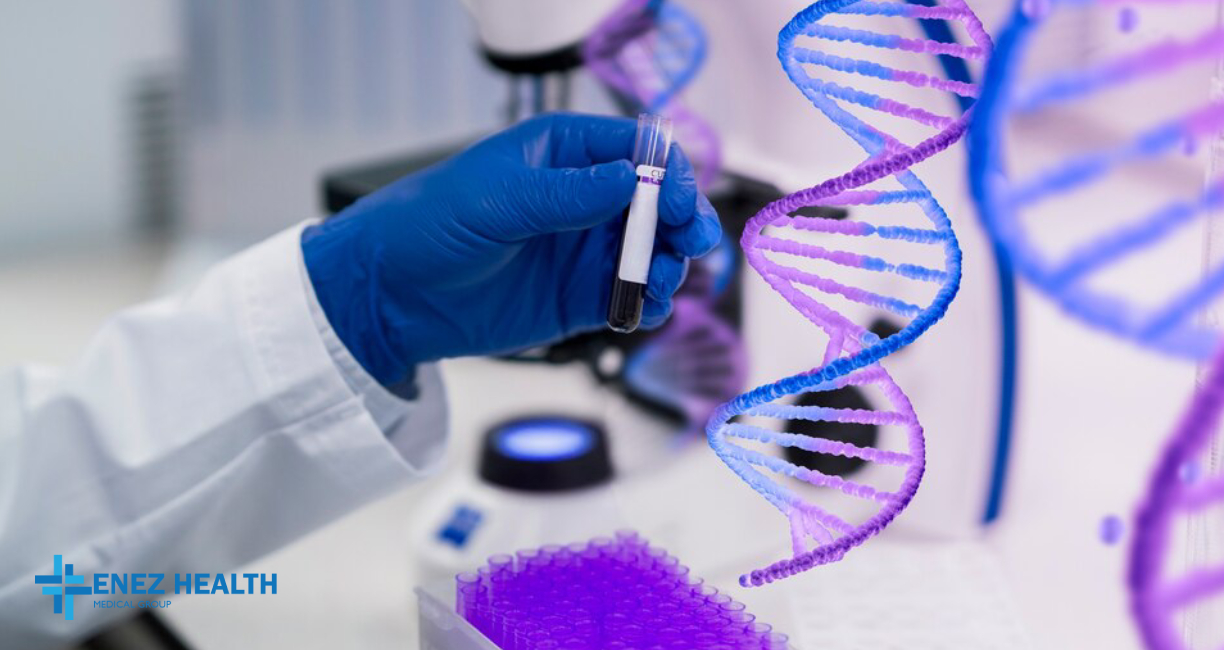
The following Prenatal and Postnatal genetic tests are carried out at the Diagnostic Center of Genetic Diseases to diagnose and treat all genetic diseases through modern genetic practices.
Prenatal
- Diagnosis of genetic diseases of the fetus in the womb: Prenatal Tests are carried out on the amniotic fluid, chorionic villus, umbilical cord blood, or fetal DNA in the mother’s blood to diagnose any disease in the fetus.
- If there is genetic disease history in the family, the presence of genetic disease is determined on a single cell of an embryo fertilized from the egg the mother and sperm of the father to ensure that a healthy embryo is transferred (preimplantation genetic diagnosis and embryo selection).
Postnatal
- Policlinic (patient examination): Finding out chromosomal mutation in children suffering from a syndrome/disease and the gene which their genetic disease is associated with, finding out the genetic disease which the mother and/or father is carrier of, giving genetic consultancy service according to obtained results, calculating the risk for their unborn children, and advising them to opt for embryo selection if necessary.
- Determining the gene mutation related to the genetic disease, diagnose, treat and follow up the disease, and directing the patients suitable for gene therapy to relevant clinics.
- Pharmacogenetic: Drugs may create different effects and/or side effects in every individual, while drug resistance may be related to a genetic disorder or deficiency of the individual. Hence, the aim is to elaborate these genetic disorders and/or deficiencies.
- Bacteria / Virus resistance: Certain pathogens may gain resistance as result of genetic mutation, while it is our task to determine these mutations in order to identify the necessity to administer alternative drugs against resistant bacteria or viruses.
- Infertility: Elaborate the genetic diseases and factors that may underly the reasons of a couple’s infertility problem.
- Organ Transplantation: Verify tissue compatibility between the donor and recipient in advance of organ or tissue transplantations such as kidney or bone marrow transplants and perform genetic tests to ascertain after the transplantation whether the transplantation has been successful.
- Cancers: Smart molecular drugs have been developed recently thanks to research on mutations in cancer cases. These drugs work in certain mutations. So, the aim is to screen these mutations to treat patients.
- Familial cancers: Approximately 10% of all cancers are of familial nature. Especially in persons with breast cancer or intestinal cancer history in their family, genetic mutation screening is performed to calculate their future risk of carcinogenesis and ensure early diagnosis and treatment of the disease.
The Diagnostic Center of Genetic Diseases is nationally and internationally accredited and is licensed by the Turkish Ministry of Health. Our test results with close to 100% accuracy are delivered to patients within the framework of Genetic Consultation.
Tags: Genetic Disease Diagnostic Center, Diagnostic Center, Genetic Diseases, All Genetic Diseases, Genetic Disease Diagnostic Department, Genetic Disease Diagnostic Center in Istanbul/Turkey
I
f
y
o
u
n
e
e
d
t
o
m
e
s
s
a
g
e
u
s
,
p
l
e
a
s
e
f
i
l
l
o
u
t
t
h
e
f
o
r
m
Services
- Aeromedical Center
- Aesthetic, Plastic & Reconstructive Surgery
- Algology
- Allergy Immunology
- Anesthesiology and Reanimation
- Biochemistry and Molecular Biology
- Cardiology
- Cardiovascular Surgery
- Check up
- Chest Diseases
- Chest Surgery (Thoracic Surgery)
- Dermatology
- Ear, Nose & Throat
- Emergency Service
- Endocrine and Metabolic Disorders
- Endocrinology, Diabetes and Metabolic Diseases
- Eye Health & Diseases
- Gastroenterological Diseases and Surgery
- Gastroenterology
- General Surgery
- Genetic Disease Diagnostic Center
- Hair Transplant Center
- Hand and Microsurgery
- Hematology
- Hemodialysis
- In Vitro Fertilization (IVF)
- Infectious Diseases and Clinical Microbiology
- Intensive Care
- Internal Diseases
- Interventional Radiology
- Laboratory Services
- Medical Oncology
- Microbiology
- Neonatal Intensive Care Unit
- Nephrology
- Neurology
- Neurosurgery
- Nuclear Medicine
- Nutrition and Diet
- Obesity Surgery
- Obstetrics and Gynecology
- Oral And Dental Health
- Organ Transplantation Centers
- Orthodontics
- Orthopedics and Traumatology
- Pathology
- Pediatric Allergy and Immunology
- Pediatric Cardiology
- Pediatric Endocrinology
- Pediatric Gastroenterology, Hepatology & Nutrition
- Pediatric Health and Diseases
- Pediatric Hematology
- Pediatric Intensive Care
- Pediatric Nephrology
- Pediatric Neurology
- Pediatric Oncology
- Pediatric Surgery
- Pediatric Urology
- Perinatology
- Physical Therapy and Rehabilitation
- Podology
- Psychiatry
- Psychology
- Radiation Oncology
- Radiology
- Rheumatology
- Stroke Center
- Urology

